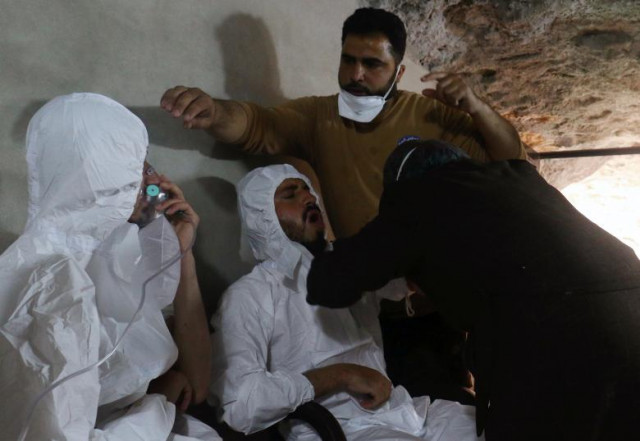Outrage as Syria 'chemical attack' kills dozens in rebel-held town
The UN Security Council is to hold an emergency meeting on Wednesday to discuss the attack

A man breathes through an oxygen mask as another one receives treatments, after what rescue workers described as a suspected gas attack in the town of Khan Sheikhoun in rebel-held Idlib, Syria April 4, 2017. PHOTO: REUTERS
The attack on the town of Khan Sheikhun killed at least 58 civilians and saw dozens suffer respiratory problems and symptoms including vomiting, fainting and foaming at the mouth, the Syrian Observatory for Human Rights monitoring group said.
Syria's opposition blamed President Bashar al-Assad's forces, saying the attack cast doubt on the future of peace talks.
'Gas' attack kills 35 in rebel-held Syria town
The army denied any involvement in a statement blaming "terrorist groups" for using "chemical and toxic substances".
At least 19 children and 13 women were among the dead, the Observatory said, and an AFP correspondent in Khan Sheikhun saw many people on respirators.
If confirmed, it would be one of the worst chemical attacks since Syria's civil war began six years ago.
The incident brought swift international condemnation, with the United States, France and Britain presenting a draft resolution to the UN Security Council demanding a full investigation.
"This is clearly a war crime," British Ambassador Matthew Rycroft told reporters.
The Tahrir al-Sham rebel alliance, which includes Al-Qaeda's former affiliate, the Fateh al-Sham Front, vowed to avenge the deaths, calling on fighters to "ignite the fronts".
Washington condemned what it called a "reprehensible" attack by Assad's forces and US officials said his allies Russia and Iran must bring the dictator to heel.
"While we continue to monitor the terrible situation, it is clear that this is how Bashar al-Assad operates: with brutal, unabashed barbarism," Secretary of State Rex Tillerson said.
UN envoy Staffan de Mistura said the attack was believed to be chemical and launched from the air, adding there should be a "clear identification of responsibilities and accountability".
The Observatory said the attack on a residential part of Khan Sheikhun came early on Tuesday, when a warplane carried out strikes that released "toxic gas".
As well as those killed, at least 160 people were injured, it said, and many died even after arriving at medical facilities.
The monitor could not confirm the nature of the gas, but said the attack was probably carried out by government warplanes.
"We ran inside the houses and saw whole families just dead in their beds," resident Abu Mustafa said.
"Children, women, old people dead in the streets."
Russia's military, which has been fighting in support of Assad's government since September 2015, denied carrying out any strikes near the town.
Syria evacuation of four towns delayed: monitor
Hours after the initial attack, air strikes also hit a hospital in the town where doctors were treating victims, the AFP correspondent said, bringing down rubble on top of medics as they worked.
He saw a young girl, a woman and two elderly people dead at a hospital.
A father carried his dead little girl wrapped in a sheet, her lips blueish and her dark curls visible.
Speaking to AFP, medic Hazem Shehwan said victims of the earlier attack had symptoms including "pinpoint pupils, convulsions, foaming at the mouth and rapid pulses".
Khan Sheikhun is in Idlib province, which is largely controlled by the Tahrir al-Sham rebel alliance.
The province is regularly targeted in government and Russian air strikes, and has also been hit by the US-led coalition fighting the Islamic State group, usually targeting jihadists.
The Observatory said 16 people, including 11 children, were killed Tuesday by air strikes in Salqin, in north Idlib province.
Syria's leading opposition group, the National Coalition, blamed Assad for the Khan Sheikhun attack.
Damascus officially joined the Chemical Weapons Convention and turned over its declared chemical arsenal in 2013, as part of a deal to avert US military action.
That agreement came after hundreds of people - up to 1,429 according to a US intelligence report - were killed in chemical weapons strikes allegedly carried out by government troops east and southwest of Damascus.
But there have been repeated allegations of chemical weapons use since, with a UN-led investigation pointing the finger at the regime for at least three chlorine attacks in 2014 and 2015.
The army again denied using chemical weapons on Tuesday, insisting "it has never used them, any time, anywhere, and will not do so in the future".
More than 320,000 people have been killed in Syria since the conflict began in March 2011 with anti-government protests.
Successive rounds of peace talks, including a UN-sponsored meeting in Geneva last week, have failed to produce a political breakthrough.
Air strikes hit hospital treating Syria 'gas attack' victims: AFP
Tuesday's attack cast new doubt on the peace process, said the opposition's chief negotiator Mohamad Sabra.
"If the United Nations cannot deter the regime from carrying out such crimes, how can it achieve a process that leads to political transition in Syria?" he told AFP.
A senior Syrian security source told AFP that opposition forces were trying to "achieve in the media what they could not achieve on the ground" by spreading images from the alleged attack site.
The UN Security Council is to hold an emergency meeting on Wednesday to discuss the attack following calls from France and Britain.



















COMMENTS
Comments are moderated and generally will be posted if they are on-topic and not abusive.
For more information, please see our Comments FAQ